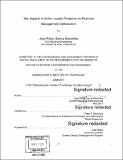The impacts of airline loyalty programs on revenue management optimization
Author(s)
García Saavedra, Juan Pablo
DownloadFull printable version (16.84Mb)
Other Contributors
System Design and Management Program.
Advisor
Peter P. Belobaba.
Terms of use
Metadata
Show full item recordAbstract
Loyalty Programs have evolved over years turning into unique business units, responsible for producing an important source of revenue for airlines. However, despite their contribution to the business, the lack of knowledge on the impacts of giving away rewards to loyal customers may lead to suboptimal decisions, harming bottom line results. The main objective of this thesis is to develop a methodology to model and measure the net revenue impacts of award passengers as they integrate to current airline revenue management optimization practices. By modeling an award demand using the Passenger Origin Destination Simulation tool, it was possible to understand the impacts on airlines' main metrics compared to an environment without these passengers, and to define a baseline scenario based on current airline industry data, to analyze the impacts of different RM strategies. A methodology was proposed to identify and quantify three main effects seen when allowing award passengers into the current RM optimization. The Award Revenue accounts for the economic benefit for the airline of each award passenger. Displaced Revenue is the ticket revenue loss due to the displacement of paid passengers. And, the Sell Up effect measures the change in average paid fare as a result of the introduction of this new demand. Differences between the real economic benefit to the airline of award passengers and the value that the RM optimizer uses for assigning their availability were introduced to measure the net award revenue impact. Results showed that at award valuations higher than the lowest fare, airlines are able to increase their total revenues due to higher award revenue and lower displaced ticket revenue. This outcome was consistent for all RM Schemes and demand levels examined.
Description
Thesis: S.M. in Engineering and Management, Massachusetts Institute of Technology, System Design and Management Program, 2017. Cataloged from PDF version of thesis. Includes bibliographical references (pages 105-107).
Date issued
2017Department
Massachusetts Institute of Technology. Engineering and Management Program; System Design and Management Program.; Massachusetts Institute of Technology. Integrated Design and Management ProgramPublisher
Massachusetts Institute of Technology
Keywords
Engineering and Management Program., Integrated Design and Management Program., System Design and Management Program.